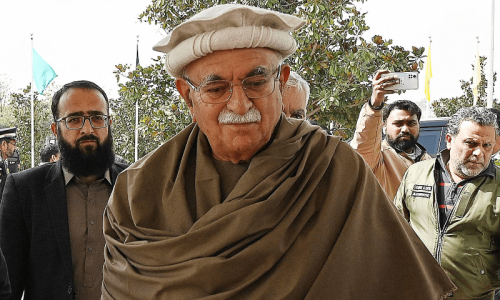
BEIJING:China is facing a network of militants entrenched in neighbouring states, but authorities, especially in Pakistan, are trying to stamp out violence and protect China's interests, the governor of China's Xinjiang region said on Wednesday.
China has blamed incidents of violence in Xinjiang on Islamic separatists who want to establish an independent state called East Turkestan.
Some Chinese officials have blamed attacks on Muslim militants trained in Pakistan, though China's Foreign Ministry has refrained from public criticism of Pakistan.
Xinjiang's governor, however, was more explicit.
“We have certainly discovered that East Turkestan activists and terrorists in our neighbouring states have a thousand and one links,” Nur Bekri said on the sidelines of China's annual meeting of parliament, when asked about a Pakistan connection with attacks in Xinjiang.
“But officials, especially in Pakistan, have said over and over again they oppose any violent activities directed against China and will maintain China's national sovereignty and core interests,” he said.
Both Chinese and Pakistani officials have in the past said that the militants based in western China have ties to the Pakistani Taliban and other militants in northwestern Pakistani regions along the Afghan border.
Officials in Kashgar, a city in south Xinjiang, said a stabbing attack there in late July was orchestrated by members of the separatist East Turkestan Islamic Movement who trained in Pakistan before returning to China.
Bekri said he was assured of Pakistani support in the campaign against militancy.
“China and Pakistan are indeed all-weather friends. This is the basis founded by the previous generations of leaders,” Bekri said.
Pakistan and China have long been allies but Pakistan has leaned closer to China after its tense relationship with the United States, its major donor, was strained in May when US forces killed Osama bin Laden in Pakistan where he appears to have hidden for several years.
China sees Xinjiang as a bulwark against the predominantly Muslim countries of central Asia. The region, with a sixth of the country's land mass, is also rich in natural resources, including oil, coal and gas.
The Muslim Uighur people account for just over 40 percent of the region's 21 million population. Many chafe at government controls on their culture and religion.
Last week, the government said attackers wielding knives killed 13 people in a remote southern part of Xinjiang before police shot seven of them dead.
Exiled Uighur groups and human rights activists say China overstates the threat posed by militants in Xinjiang, which sits astride south and central Asia.















































Dear visitor, the comments section is undergoing an overhaul and will return soon.